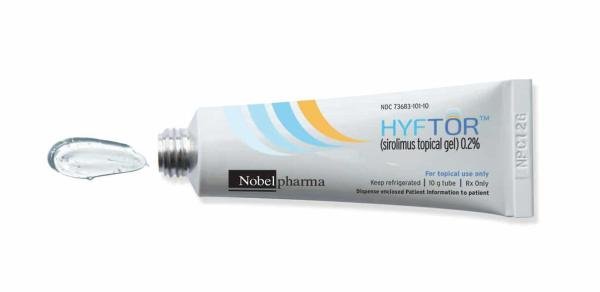Sirolimus topical
Generic name: sirolimus topical [ sir-OH-li-mus ]
Brand name: Hyftor
Dosage form: topical gel (0.2%)
Drug classes: MTOR inhibitors, Selective immunosuppressants
What is sirolimus topical?
Sirolimus topical is used on the skin to treat people 6 years and older with a type of tumor called angiofibroma on your face caused by the genetic condition tuberous sclerosis.
Sirolimus topical may also be used for purposes not listed in this medication guide.
Sirolimus topical side effects
Get emergency medical help if you have signs of an allergic reaction: hives; difficult breathing; swelling of your face, lips, tongue, or throat.
Sirolimus topical may cause a brain infection that can lead to disability or death. Tell your doctor if you have problems with speech, thought, vision, or muscle movement. These symptoms can get worse quickly.
Sirolimus topical may cause serious side effects. Stop using sirolimus topical and call your doctor at once if you have:
-
signs of infection--fever, chills, sore throat, body aches, unusual tiredness, loss of appetite, bruising or bleeding; or
-
chest pain, shortness of breath, or new or worsening cough.
Common side effects of sirolimus topical may include:
-
acne, rash, skin bleeding, dry skin;
-
irritation at the treatment site;
-
itching; or
This is not a complete list of side effects and others may occur. Call your doctor for medical advice about side effects. You may report side effects to FDA at 1-800-FDA-1088.
Warnings
Use only as directed. Tell your doctor if you use other medicines or have other medical conditions or allergies.
Before taking this medicine
You should not use sirolimus topical if you are allergic to it.
Tell your doctor if you have ever had:
-
skin infection at the treatment site;
-
high blood cholesterol or high triglycerides (fat or lipids); or
-
if you are scheduled to receive a vaccine.
May harm an unborn baby. You may need a pregnancy test to make sure you are not pregnant. Use effective birth control while using sirolimus topical and for at least 12 weeks after your last dose. Tell your doctor if you become pregnant.
Sirolimus topical may affect fertility in men or women. Pregnancy could be harder to achieve while either parent is using sirolimus topical.
Do not breastfeed.
How should I use sirolimus topical?
Follow all directions on your prescription label and read all medication guides or instruction sheets. Use the medicine exactly as directed.
Wash your hands before and after using sirolimus topical.
Apply sirolimus topical to the skin of the face twice a day, in the morning and at bedtime.
Do not cover treated skin with a bandage unless your doctor tells you to.
Call your doctor if the treated skin does not improve within 12 weeks of treatment.
Using sirolimus topical may increase your risk of developing cancer. Ask your doctor about your individual risk.
Your blood may need to be tested during treatment.
Store in the refrigerator, do not freeze.
Sirolimus topical dosing information
Usual Adult Dose for Angiofibroma:
Usual dose: Apply to the skin of the face affected with angiofibroma twice daily, in the morning and at bedtime.
Maximum dose: 800 mg (2.5 cm)
Comment:
If symptoms do not improve after 12 weeks of treatment, reassess the need for continuation of this drug.
Use: Topical treatment of facial angiofibroma associated with tuberous sclerosis
Usual Pediatric Dose for Angiofibroma:
Usual dose: Apply to the skin of the face affected with angiofibroma twice daily in the morning and at bedtime.
Maximum dose: 600 mg (2 cm) for patients 6 to 11 years of age, 800 mg (2.5 cm) for patients 12 to 18 years of age
Comment:
If symptoms do not improve after 12 weeks of treatment, reassess the need for continuation of this drug.
Use: Topical treatment of facial angiofibroma associated with tuberous sclerosis
What happens if I miss a dose?
Apply the medicine as soon as you can, but skip the missed dose if it is almost time for your next dose. Do not apply two doses at one time.
What happens if I overdose?
Seek emergency medical attention or call the Poison Help line at 1-800-222-1222.
What should I avoid while using sirolimus topical?
Sirolimus topical could make you sunburn more easily. Avoid sunlight or tanning beds. Wear protective clothing and use sunscreen (SPF 30 or higher) when you are outdoors.
Avoid receiving a "live" vaccine. The vaccine may not work as well while you are using sirolimus topical. Live vaccines include measles, mumps, rubella (MMR), rotavirus, typhoid, yellow fever, varicella (chickenpox), and zoster (shingles).
Avoid getting sirolimus topical in your eyes, mouth, or vagina.
What other drugs will affect sirolimus topical?
Sometimes it is not safe to use certain medicines at the same time. Some drugs can affect your blood levels of other drugs you use, which may increase side effects or make the medicines less effective.
Other drugs may affect sirolimus topical, including prescription and over-the-counter medicines, vitamins, and herbal products. Tell your doctor about all other medicines you use.
More about sirolimus topical
- Check interactions
- Compare alternatives
- Side effects
- Dosage information
- During pregnancy
- Drug class: mTOR inhibitors
- Breastfeeding
- En español
Patient resources
Other brands
Professional resources
Other brands
Related treatment guides
Further information
Remember, keep this and all other medicines out of the reach of children, never share your medicines with others, and use this medication only for the indication prescribed.
Always consult your healthcare provider to ensure the information displayed on this page applies to your personal circumstances.
Copyright 1996-2024 Cerner Multum, Inc. Version: 1.01.

